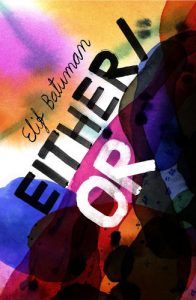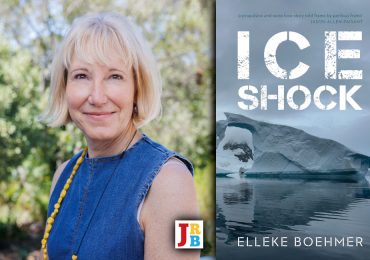Elif Batuman’s Either/Or is a new and worthy entry into the well-populated gallery of erudite books about people learning how to live in the world, writes Wamuwi Mbao.

Either/Or
Elif Batuman
Penguin, 2022
You’ve no doubt noticed that the past is back. After three years of suspenseful pandemic panic, the world is casting about for a cultural fantasy that turns its back on the new in favour of the granitic. This is why you’re being importuned to give your deferential reading attention to new works of fiction by old masters. Cormac McCarthy has a duo of doorstops out—his first for sixteen years. Jonathan Franzen’s most recent tome will be making its way to the charity shops by now (shamefully unread in many cases), but Joyce Carol Oates will have something out soon, if you hang about for a bit.
That crowd are joined by the perpetually renewing group of vital new talents whose common bond is that they all hold mysterious chairs of creative writing at one-name colleges (‘the Wassily K Shrute Chair in Creative Writing at Gordon’ … what does this mean?) and who, if asked what they’re reading, will declare with solemn piety that they don’t read anything contemporary and are absorbed in the minor novels of Henry James. This kind of literature inspires awe and admiration, but it all starts to feel like a hall of mirrors after a while: do we always want to read about ourselves? Faced with all these novels of wearisome self-knowledge, it isn’t a very long way down the road to arguing that the most gorgeous creative narrative output of the year was actually produced by Taylor Swift, and damn the form—?
Elif Batuman’s Either/Or is a new and worthy entry into the well-populated gallery of erudite books about people learning how to live in the world, a category that encompasses everyone from Rachel Cusk to Sheila Heti, authors who all use different materials to build houses in the same style. Don’t say autofiction. Part campus novel, part coming-of-age narrative, Either/Or is a follow-up to the hilarious and excellent The Idiot, which was nominated for the Pulitzer Prize in 2018. This second novel takes place in 1996, with Selin, whom we first met as a new Harvard inductee, now a freshman in her second year. With progress comes a shift in tone. Where The Idiot balanced on its wonderfully funny narrative, with Selin musing on what it means to have email (‘“You’ll be so fancy,” said my mother’s sister, who had married a computer scientist, “sending your e, mails.” She emphasized the “e” and paused before “mail.”’) Either/Or is more serious, or at least differently contemplative. Recognition’s cringe is still there, but it mixes with the readerly enjoyment of how Batuman gets inside those familiar times in this smooth-running novel.
Batuman’s protagonist is on one level a kind of literate Emma Chamberlain, an unmoored protagonist trying to curate a life on her chosen grounds via a number of Great Works. She reads Kierkegaard—from whom the title of the novel is filched with a healthy soupcon of irony—Pushkin and Breton, to figure out what the risibly twattish Ivan actually thinks of her (the answer is of course, very little), and to figure out what sort of person she should be. Everything Selin reads provides a version of her story to build on. She begins to wonder about the possibility of another version of life, at a time when her cast of friends are becoming entangled in the boringly predictable rituals of hetero boy-girl routines, drifting towards the maw of the adult world.
But there are alternatives out there. Selin reads Joris-Karl Huysmans’ Against Nature, and finds in it the compelling idea of an ‘aesthetic life,’ a set of ideas about how to live actively in the world, rather than letting things happen to you:
It was the first time I had heard of an organizing principle or goal you could have for your life, other than making money and having kids. Nobody ever said that that was their organizing principle, but I had often noticed it, when I was growing up: the way adults acted as though trying to go anywhere or achieve anything was a frivolous dream, a luxury, compared to the real work of having kids and making money to pay for the kids.
Selin finds herself steadily drifting from her friend Svetlana (another recurring character), whose slightly wrong-headed ideas about life are defined (by Svetlana herself) as the ethical ‘or’ in relation to Selin’s ‘either’. What follows is a series of digressive scenes in which Selin attends classes, reads things, talks to people, or simply watches and observes.
I’m doing the novel a disservice, of course: that’s the structure, but the infill is far more interesting than that. There are fantastic passages in which Selin contemplates whether she is too white to listen to The Score (1996, remember?), or acerbically remarks on why the supposedly Turkish Keyser Söze doesn’t have a Turkish name; these moments remind us that Selin’s position is slightly off the white centre. Of course, that feeling increases when Selin later takes a holiday job in Turkey, writing for an in-period guidebook that places her in an awkward tug-of-war between the imaginative impoverishment of America’s dominant cultural ethos, and the unsentimental familiarity of a world she knows through her family.
Batuman’s novels share a fluency of narrative that is deeply readable. Either/Or can never be felt straining to achieve a particular kind of effect, perhaps because she paints her scenes with a light brush, while being delightfully exact in her descriptions. On one level, this is a deceptively easy style to emulate. Characters who walk around in a world recognisably studded with 2022’s cultural markers of what 1996 looked like and say witty things about Robert Walser don’t suggest that their author’s weltanschauung expands much beyond the boundaries of their character. But Either/Or glitters with jewel-like moments. Late for a Pilates class, Selin tries to find a place for herself in a too-small venue where everyone ignores each other passive-aggressively:
I found myself looking to the instructor to arbitrate, but the instructor never did care about the fair allocation of space. She just said, ‘There’s plenty of room for everyone.’ This was because of how flattered she felt by the number of people who came to the class, which she took as a personal compliment, rather than an indication of how stressed-out we were about our bodies. Every time a new person walked in the door, causing dread in everyone who was already there, the instructor seemed happier and more pleased with herself.
It’s harder than it looks to turn living into usable fiction. The temptation with much of the last decade’s how-it-looks-from-here fiction is to adopt a mean-spirited scepticism. Indeed, the presumptuous belief that there is profound literary material to be mined from the ivy leagues, from the worlds of Ivy League-proud people who are liked by the New Yorker, can grate because of how shoe-gazey it looks and sounds. But on the other hand, since the literary world seems endlessly accommodating of yet another man telling us how things are, it is pleasing and heartening to read introspective characters who aren’t glossed with the Knausgaardian curse of believing that everything they think is interesting.
Some readers will undoubtedly be put off by the seeming aimlessness of this novel, the way it proceeds by digression, stopping to turn over a philosophical page here or there. But while I think Either/Or rewards a patient read, it’s by no means heavy weather. All that nervy Daria-style discourse does eventually excavate a point that is important: there is no ready manual for living, and the lesson inherent in that slow realisation is expressed with comedy and pathos.
- Editorial Advisory Panel member Wamuwi Mbao is an essayist, cultural critic and academic at Stellenbosch University. Follow him on Twitter.





